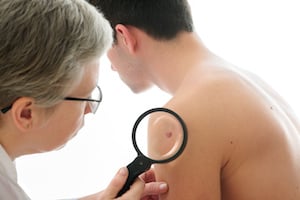Skin Cancer and Melanoma
Skin cancer is the most common type of cancer in the US. It begins on the outer layer of skin, called the epidermis, and is most often caused by exposure to UV light including sunlight and artificial UV light from tanning beds. However, skin cancer can appear anywhere on your body even if it wasn’t exposed heavily to UV light.
There are two primary categories of skin cancer:
-
Melanoma
-
Non-melanoma skin cancers
Review this section's important information about skin cancer risk factors, signs and symptoms, staging, and treatment options as you prepare for your first appointment. Then, we will help you and your family in making treatment decisions, together with our medical team at Virginia Oncology Associates. During this process, you will gain the knowledge and confidence to help manage your cancer and continue activities of your daily life.
If you find any new marks, moles, or spots on your skin, it is always best to see a skin cancer specialist, who can provide an exam and provide a biopsy, if needed. The sooner a skin cancer can be diagnosed as non-melanoma or melanoma, the better your chance of a positive treatment outcome.
There is no way to completely prevent skin cancer. Some skin cancers are caused by factors that you can control - like overexposure to UV light including the sun and artificial UV light from tanning beds, but other are not. Find out what you can do to avoid skin cancers from developing.
Knowing what type and stage of your skin cancer is important because it will affect your treatment options. There are three major types of skin cancers, grouped into two categories:
Non Melanoma Skin Cancers
- Basal Cell Carcinoma (BCC)
- Squamous Cell Carcinoma (SCC)
Melanoma - The most dangerous type of skin cancer.
Your skin cancer specialist at Virginia Oncology Associates will work together with you to develop a skin cancer treatment plan that’s best for you based on your type and stage of cancer and your general overall health. Your treatment options may include:
- Surgery
- Radiation Therapy
- Photodynamic Therapy
From support groups to community resources, genetic counseling to financial counseling with our Patient Benefit Representatives, the cancer specialists at Virginia Oncology Associates are here for you every step of the way. We encourage you to learn more and take advantage of our supportive care services.
Benefits of Skin Cancer Treatment at Virginia Oncology Associates
Skin cancer treatment at Virginia Oncology Associates includes extensive personalized treatment planning and care throughout the entire process. Here are just a few of the ways Virginia Oncology Associates is a leader in skin cancer care.
- Individualized treatment planning based on the specific type of skin cancer and each patient’s situation
- Review of each patient by a team of doctors
- Patient guidance throughout the treatment process
- Skin cancer research trials
- Latest skin cancer treatment options
- Work closely with other health care providers including dermatologists and skin cancer surgeons.
Convenient Appointments
Our scheduling staff will work with patients to arrange convenient appointments at our nine locations throughout Virginia.


Additional Skin Cancer Education











